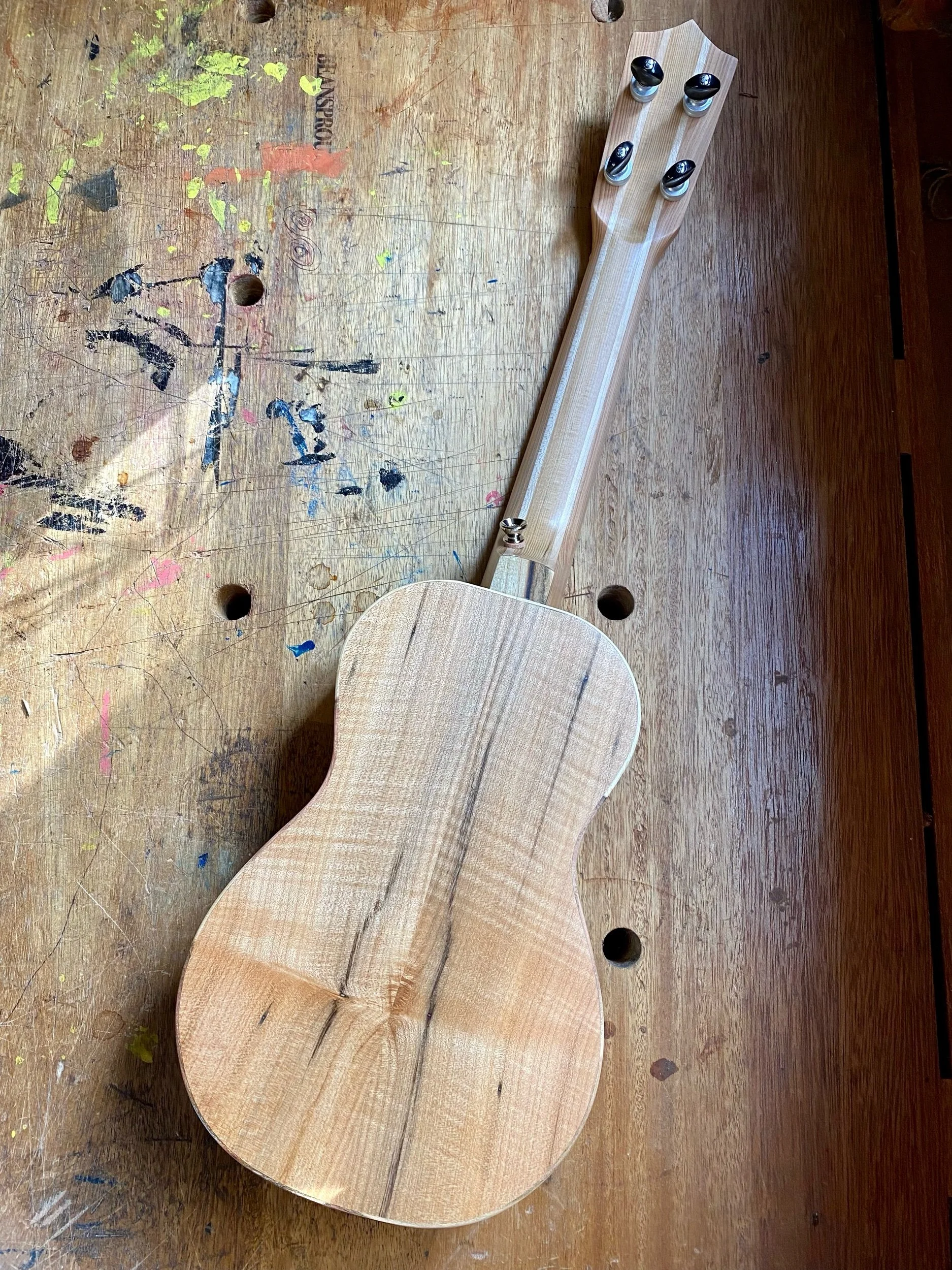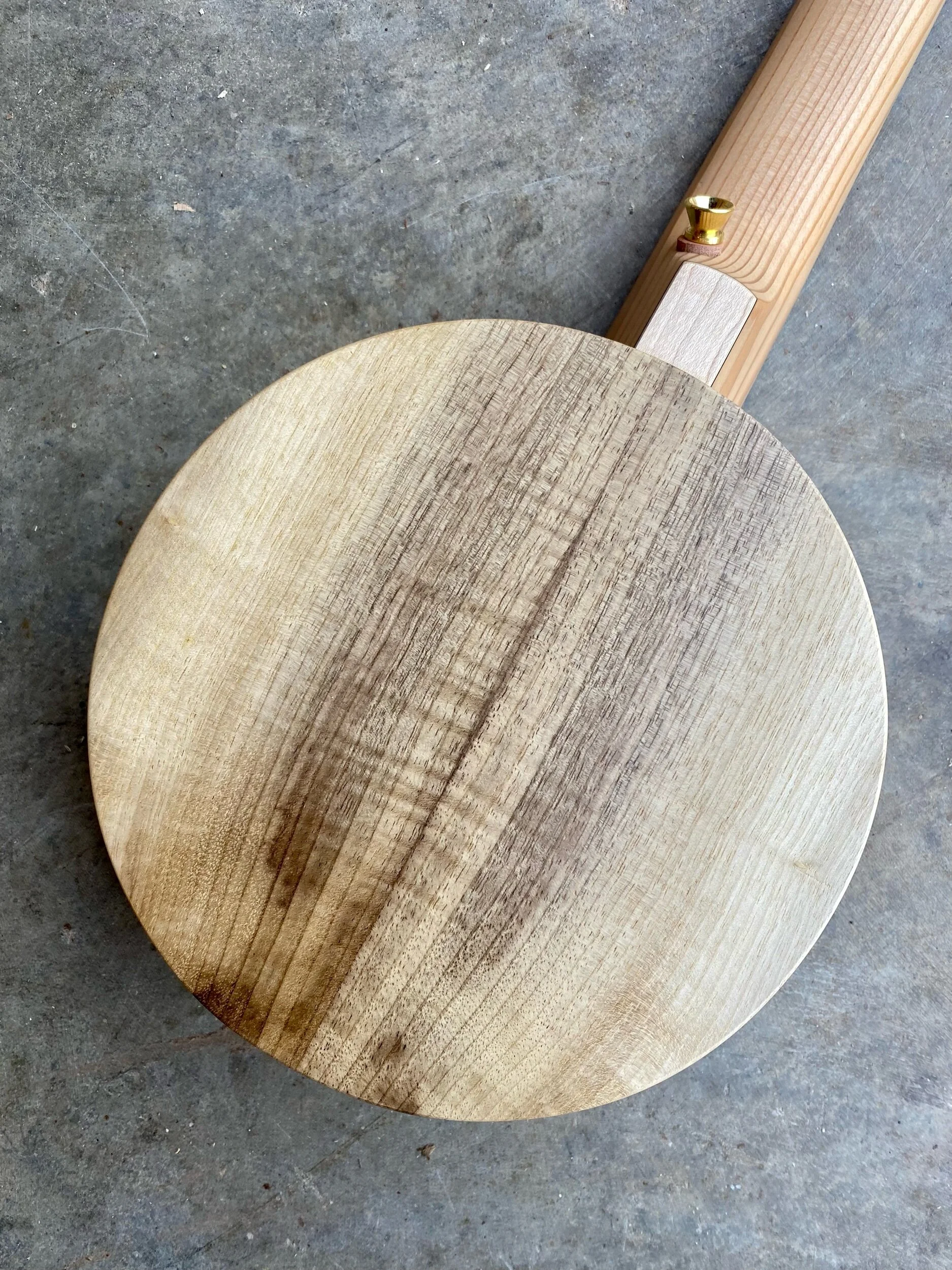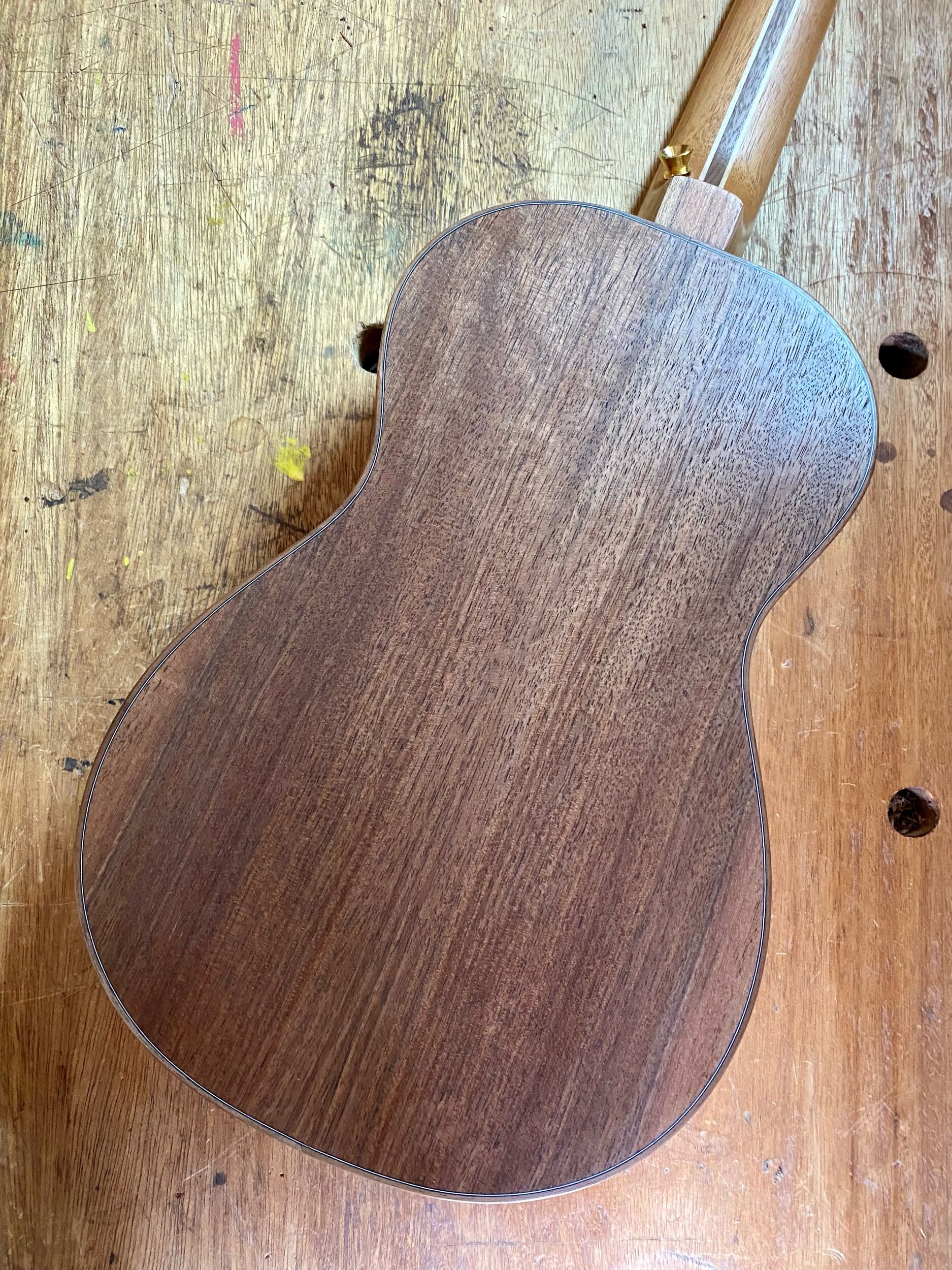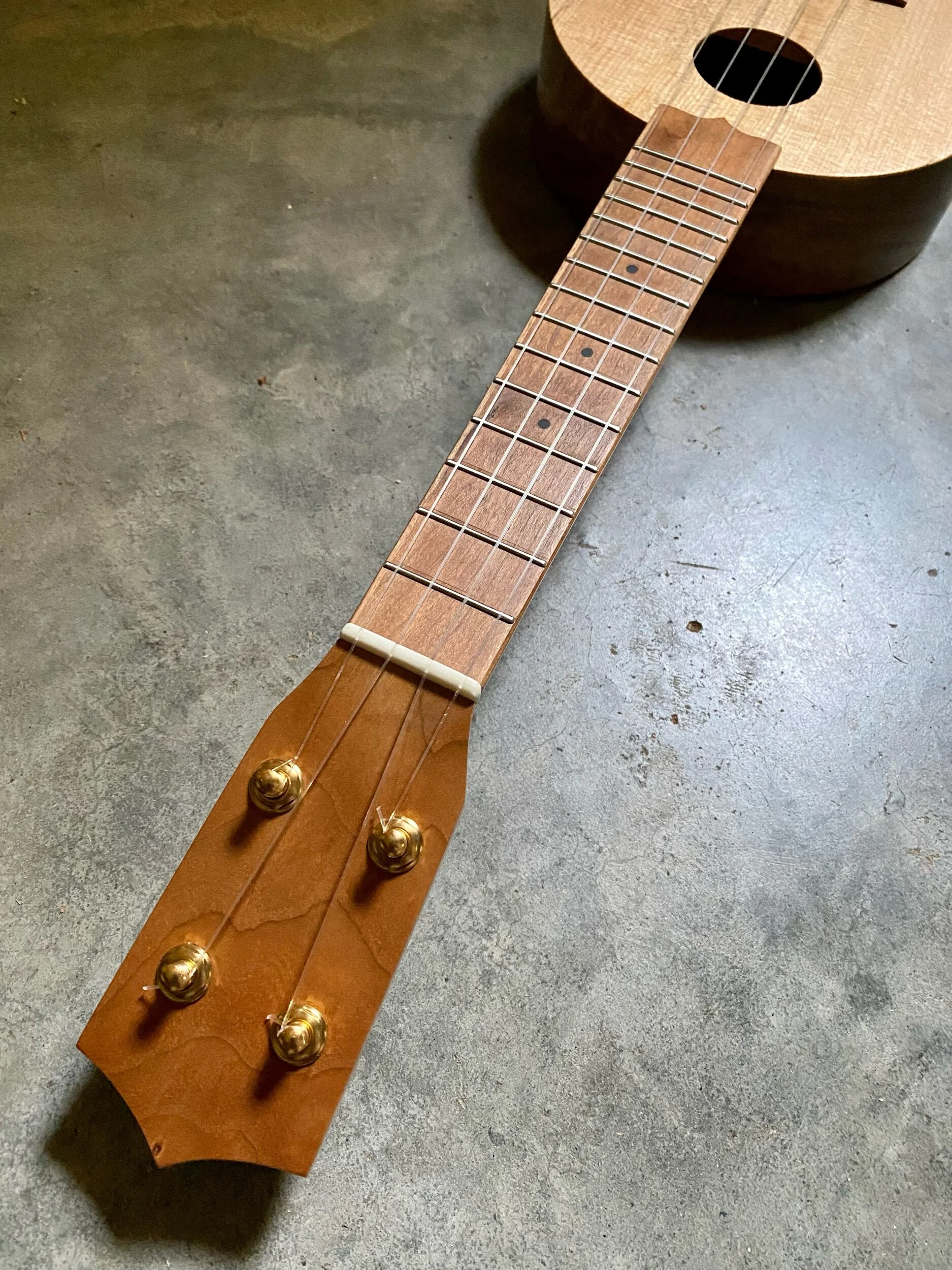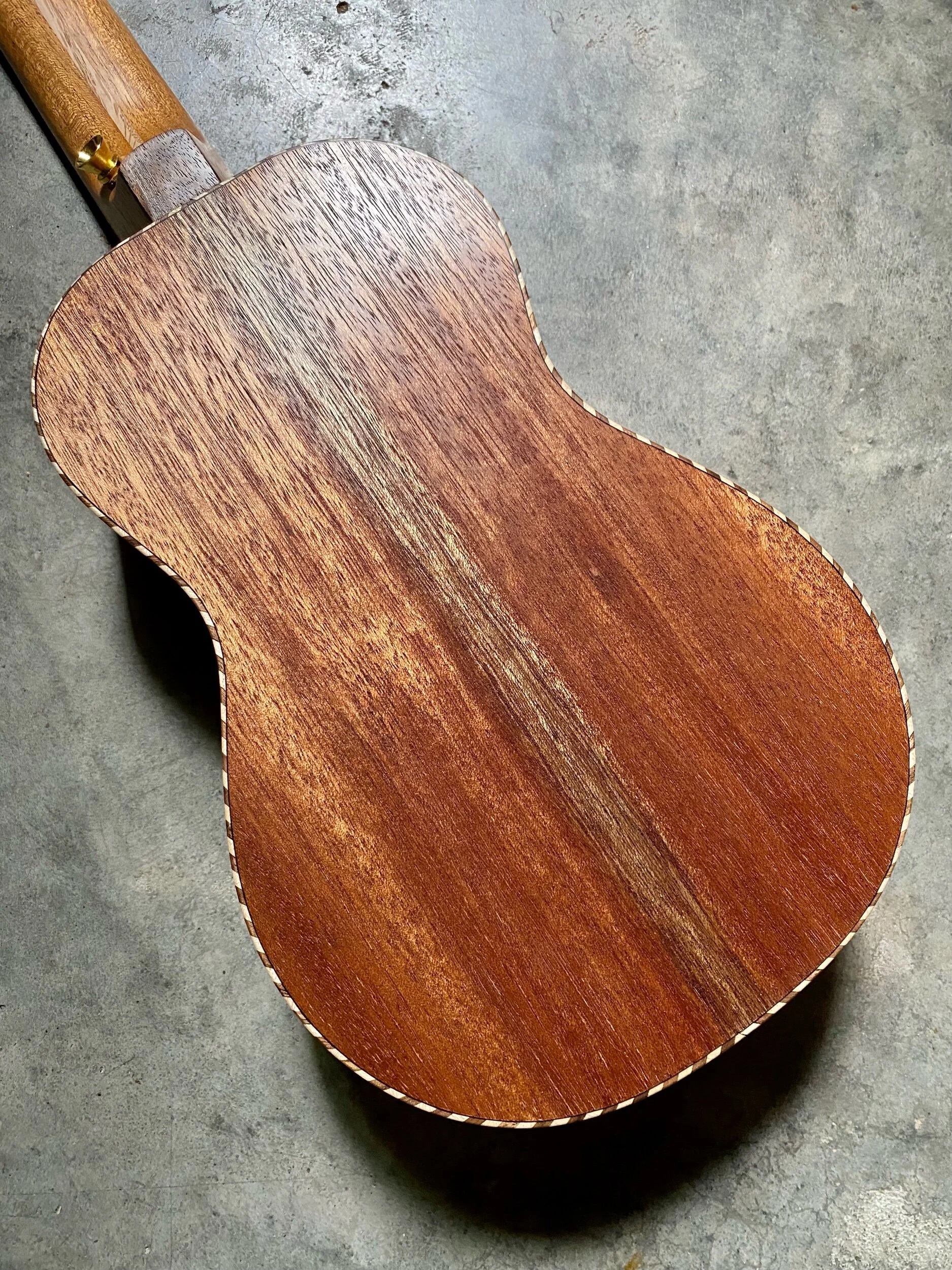This banjo is for our friend Dennis, who has been playing Clawhammer ukulele for many years and is ready to try it on banjo. It is an 11” rim with a 20” scale neck, our short scale five string banjo. Maple rim and Mahogany neck stained to match with a Jatoba/Brazilian Cherry fretboard. The brass is aged and the head is stained with walnut ink from our yard, foraged and processed by Henry and his friends. All the wood is from the Carpenter Ant stash in Portland.
#639- Curly Walnut and Pistachio Five String Banjo
When I build a banjo like this, I keep it for a little while so the neck, head and rim can settle in. I adjust it a bit every day until it’s ready to ship. Sometimes, they are pretty hard to let go, especially this one. Local curly Walnut from The Dee Mill and Pistachio from California Orchards. A wooden tone ring with non steel strings. 11” rim and 25.5” scale length. Check out the shoes, hooks and nuts from Brooks Masten. So sweet.
#633- Builder’s Choice- Alaskan Yellow Cedar and Curly Maple Alto Ukulele
If you have been following us for a while, you probably know how special Camp Westwind is to us. On the Salmon River estuary, with Spruce forest, tide pool beaches and rocky cliffs, it is a favorite retreat for our family. This top is made from Alaskan Yellow Cedar, harvested from a log that our friend Duncan found on the beach at Westwind. He cut a slice off it to use in his printing projects, which allowed him to count over 250 annual rings. We cut two sections of the trunk and have been splitting, milling and drying ever since. This is the first ukulele with this special wood! The back and sides are curly, spalted Maple, harvested by our friend Ben Bonham. The combination looks rustic and sounds sweet, I’ll certainly use it again. The neck is Hemlock and the fretboard, headplate, bridge and binding are Pistachio from California orchards.
#635- Douglas Fir and Curly Red Oak Tenor Ukulele
An all domestic wood tenor ukulele with a big, bold sound. Fir and oak for the win!!! The oak and fir are from the Carpenter Ant stash in Portland and the walnut is urban salvage from Goby Walnut. The small silver keepsake inlayed in the headstock is a family heirloom given to our customer from her late mother. Thanks Maja for entrusting us with something so special.
“Dear Aaron, Nicole and Henry,
Please know that #635 is incredibly special to me.
It’s built so honestly and the sound is a delight - l find l never stop smiling when l play it and it brings me so much joy. The heart inlay is perfect. You did such a good job of it Aaron - l can’t thank you enough. Before l play it, l look at it, hold it and appreciate what a fine instrument it is.
Take care and enjoy the snow!
Cheers,
- M. Z.
(The trees (logs) in the pictures are Eucalyptus obliqua - Stringybark or Messmate.)”
#634- Curly Port Orford Cedar and Mastergrade Myrtle Tenor Ukulele
I got the chance to talk to this customer on face time, and it was a pleasure. He said he wanted “wavy, wabi-sabi and binding optional”! He also wanted to be surprised with how it looked when opened the case, so I didn’t send any progress pictures. I chose an asymmetrical and curly Myrtle back and sides, with a slice of sapwood in it. It made sense to pair it with a multi colored pistachio fretboard and headplate that includes some tractor blight markings and sapwood. After all that, I chose a Port Orford Cedar top that was a little wavy, but not too much. The neck is salvaged Cypress from a mustard tank with some hard maple stripes. I like it with no binding, as it softens the look of the edges and borders, emphasizing the muted earth tones.
“I wanted to let you know that I received the uke and it is wonderful! I’m overjoyed with the selections you made - the asymmetric myrtle, mustard cypress neck, wild pistachio fretboard, clean look without binding...
You really captured what I hoped for in a custom uke and the craftsmanship is superb.
I’m especially glad that I had zero input into its design - it turned out so well, likely as a result - so light, resonant and looks/smells great! Thank you for the hard work you put into its construction - it really is a delight to play such a high-quality handcrafted instrument.
All the best,
M.F .”
#636- Maple and Pistachio Concert Banjo Ukulele
A classic design with some small unique touches from Mother Nature! The first Beansprout model I ever built was a maple concert banjo ukulele and they always sound “right” to me. The maple rim has some spalting and bark inclusions that give it some nice color variations. The pistachio has some beautiful stripes as well. The customer asked for a low fourth string, which is a great sound. The maple is all leftover from our kitchen cabinets and the pistachio comes from California Orchards, www.woodfromthewest.com.
#632- Fir and Curly Koa Scout Ukulele
Koa is precious. Any scrap I’ve salvaged over the years deserves to be used for something useful. I don’t support the Colonial takeover of the islands or the depletion of the forests. But I do support modern reforestation efforts and indigenous rights. Part of the profits from this build will go to https://savinghawaiisforests.org to plant new Koa trees. Consider pitching in yourself.
The Douglas Fir for this ukulele is from the Carpenter Ant stash, the Pistachio comes from California Orchards and the Koa is scrap left from my time at Mya-Moe.
“So, my special box of musical air arrived today— huzzah!
What an extraordinarily pretty little hoot, this Scout.
An exquisite surprise, in the mix:
Bird’s foot!
(I mean, just look at all that beauty, in the wood and grain and how you’ve brought everything together.)
Thank you so much.
- S. S.
”
#629- Bearclaw Spruce and Grafted Walnut Baritone Ukulele
This is a really special ukulele, made from some really special pieces of wood. All of these pieces needed a bit of persuasion to do their part in the process, as they all were grafted, marked, scarred or otherwise special. Salvaged Bearclaw Sitka Spruce from Alaska, grafted Walnut and grafted Pistachio from California Orchards and Douglas Fir salvaged from a floor joist.
“Aaron,
...I am in LOVE with #629. It sounds a great as it looks. The sound your instruments produce is exactly what I want. Thank you for creating such a special piece for me.
Thanks so much!
- D. C. ”
#628- Curly Myrtle Baritone Ukulele
This instrument is for our friend and collaborator, Ryan Kolberg. He wanted a second baritone ukulele with a different look and sound, so we chose this curly Myrtle and he let me loose to design the rest. I have been interested lately in the colors and shades blending together a bit by removing the black veneers and purfling that often separate layers on my instruments. Here the Cedar, Walnut and Myrtle flowing together in a Wabi-Sabi reverie. I also took a risk and broke up the book matched panels so that the grain flows around the instrument instead of with a more common rising match. I like it. The Myrtle is from the Oregon Coast via woodfromthewest.com, the Cedar neck is barn salvage by me and the Walnut is from Goby in Portland.
#627- Myrtle Scout Ukulele
I am trying to work through the Scout waiting list. Really, I am. Thanks for your patience, but I also need to sleep. 😜 This one is made from some Myrtle scraps for top/back/sides, Douglas Fir neck and Maple everything else, all from the Carpenter Ant stash in Portland. It has a pickup and is strung low g, which I think is a first for a Scout. It is rustic, beautiful, easy to play and feather light. Happy trails, little Scout.
#626- Western Red Cedar and Quilted Koa Alto Ukulele
It has been fun lately to build these smaller sizes, known for sparkly brightness, and choose woods that sound rich and dark. It makes for a nice balance and a nice playing experience, certainly worth exploring. The Cedar for this build comes from a burned out snag in Washington, the quilted Koa is from Char when she retired from Mya-Moe, the mahogany neck is a scrap from a furniture maker and the Texas Ebony is from a retired banjo builder.
“Thanks for making such a beautiful ukulele. The craftsmanship is incredible and the combination of woods, shades of color, grain patterns, and timbre makes for a truly unique instrument that is even more amazing than what I imagined. I’ve played it almost every day since I received it and the sound just keeps getting better. It is a joy to play. Bravo!
Best Regards,
M. H. ”
#631- Curly Red Oak and Walnut Tenor Banjo Ukulele
As much as I like the fancy ones, my taste often runs to the simple. In this case, the combo of curly red oak, walnut and brass. It was a treat to build and a treat to play! The oak and walnut are from The Carpenter Ant stash and are the scraps left from building a book shelf for my son. The elegant hardware is from Brooks Masten.
#630- Curly Maple and Texas Ebony Five String Banjo
I am a slow, heavy ship, which naturally turns slowly. I say “no” to many of the ideas and requests my customers have, because I take a long time to learn new skills and longer still to find a way to incorporate them seamlessly into my process. I also have a sharp urge to keep the ordering process and the aesthetics of the instruments simple, so I really don’t want too many options. In this case, Brian really wanted to bind the fretboard and headstock with rope binding. I finally said yes. It’s not perfect, but it’s honest and it looks cool. Let me do it 100 more times and I’ll be closer to getting it totally right.
Curly maple from the closing sale at Wildwood Banjos, Texas Ebony from Brown Banjos upon his retirement. Tasty darkened brass hardware from Brooks Masten and stained goat skin.
#617- Port Orford Cedar and Walnut Tenor Ukulele
When I got the call to make a pair of ukuleles for Dave Mathews, I called Ryan right away. He is a big fan and he asked for one just like Dave. He already had two build slots purchased, so the timing worked out well. I milled matching wood for four instruments and got to work. It turned out Dave needed three, so the fourth was Ryan’s. The one piece Port Orford Cedar top is from a leftover board from Mya-Moe. The Walnut is from up the road, The Dee Mill. The pistachio is from California Orchards and the mahogany is salvaged from a furniture maker.
#619- Hemlock and Dogwood Scout Ukulele
Made from scraps and cutoffs from the Carpenter Ant stash in Portland. The back and sides are Dogwood, from a tree onsite that Ken milled, dried and saved. The top is hemlock, the neck is fir and the fretboard/headplate are cherry.
#622- Curly Port Orford Cedar and Mastergrade Walnut Baritone Ukulele
Over time, this has sort of become a standard model. Curly Port Orford Cedar and Mastergrade Walnut back and sides with a crazy Pistachio fretboard. Sounds big, looks amazing and super fun to play. The top is from the Oregon cost and the grafted Walnut and Pistachio are from California orchards, all via woodfromthewest.com. The Spanish Cedar neck is from a stash of timber I bought from a retired builder.
“Hi, I want you to know that my Uke arrived safely and completely! It’s just beautiful! I’m looking out over the Pacific as I get to know her.
I have to tell you that this Uke is perfectly intoned. Usually, even my high quality Ukes need some tweaking by the Doc. But, this one is on the tones at each playable fret!
The craftsmanship is stunning, you certainly built something that will be in the family for ever.
Normally, I’d be playing something different but, after tuning this one up, I felt …almost…commanded to play
Make you feel my love by Dylan.
To each of you, my customer experience was great, my Uke is great and I hope you make millions of dollars and thousands of friends!!
Peace and Love,
- T. B. ”
#621- Wine Barrel White Oak, Pistachio and Walnut Tenor Banjo Ukulele
This instrument was ordered by Charley, a winemaker from Napa Valley with a company called March Wines. (Try the Rose!) https://www.marchwines.com I thought it would be a great opportunity to finally use the wine barrel scraps I’ve been scavenging from the winery up the road from me, https://hiyuwinefarm.com. (Try the Arco Iris!)
Wine barrels are commonly made from White Oak, which is one of my favorite woods. It makes a banjo that is loud and crisp, with an old time, dusty sound that I love. I used Pistachio from California orchards for the fretboard and headplate and some Oregon walnut trim to tie it all together. I made the tension hoop myself, inspired by Pete Ross’ riveted hoops. The other brass hardware is by my friend Brooks Masten in Portland.
#623- Mahogany Alto Ukulele
On one hand, this instrument has a traditional vibe: Mahogany body and neck, rope binding and dark fretboard. But on the other hand, it has some more modern features: wider neck, Walnut radiused fretboard, (instead of a tropical wood), geared tuners and a low fourth string. Overall, it turned out rich and sweet, easy to play and comfortable to hold. It’s off to our old friend Tony in Minnesota, happy strumming!
The Mahogany and the Walnut were salvaged from scraps from the Carpenter Ant Stash in Portland.
“I have played my Beansprout Alto a great deal since receiving it. Yes, the construction quality is a 10 out of 10. Same with the wood, the finishing and the sound. I have learned to expect nothing but the finest of all these from Beansprout. My tenor Beansprout Myrtle is the same. One of the things that is superb, but hard to describe is the feel when I am playing my Alto. It is almost an absence of feel. My Alto, which I have named Eliza after the song Little Liza Jane, sort of disappears while I am playing it. It’s like it does and sounds the way I want without me really thinking about it. It just fits perfectly and is there in my arms doing the absolute right things. I don’t know if I am describing it adequately. I do know that after owning Mya Moe, Martin, Kamaka, KoAloha and other top brands, Eliza is something special. Thank you!
- T. A.
”
#618- Douglas Fir and Pistachio Tenor Ukulele
This instrument is a tribute to everything flawed, scarred, twisted, grafted, wrinkled, salvaged or cast aside. It’s a celebration of sustainability, art, real emotions and honest work. It’s for an artist named Todd Fink, which will make perfect sense when you go to his website and check out his TED talk below.
The back, sides, headplate, fretboard and bridge are made from grafted, scarred and tractor blight Pistachio, salvaged from California orchards by woodfromthewest.com. The Douglas Fir neck and top are salvaged from the garage at the Carpenter Ant stash in Portland. The rope binding stitches it all together, unifying the two woods from California and Oregon.
It has some songs inside, I can’t wait for Todd to find them.
#620- Port Orford Cedar and Curly Walnut Tenor Ukulele
Sustainable woods, natural aesthetic, muted color palette, easy playability and a big voice. This one is a great illustration of my hard work, the things I care about and the community that surrounds our business. Thanks for giving me the chance to do this everyday and thanks for paying attention.
Port Orford Cedar top, Curly Walnut back and sides, Pistachio fretboard/headplate/bridge and Myrtle binding from woodfromthewest.com. Douglas Fir neck salvaged from a floor joist.






















